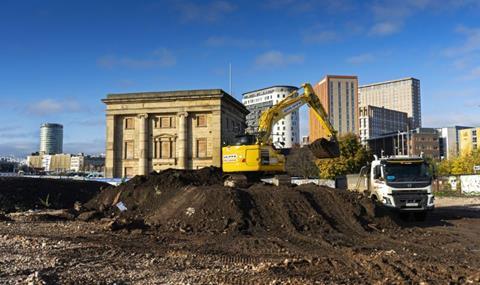
HS2 Ltd, the public body tasked with overseeing the project, has revealed that at least 500 tippers may be needed full-time during the peak of its construction.
The vast majority of the 132m tonnes of material excavated during the development of the high-speed railway will be moved by site haul plant to locations it can be safely and smartly reused in Phase One of the project without moving it off-site.
Ben Goodwin, HS2 communications manager: Phase Two – Eastern Leg, told motortransport.co.uk that there will still be some that cannot be reused and that the project will move more excavated material out, and replacement aggregated in, by rail than it will by road using tippers.
"Nonetheless, current expectations are that the project could require at least 500 tippers full time at construction peak, which will likely be in the summers of 2021 and 2022," he said.
"During 2020, multiple construction site compounds and sites will commence operation along the length of Phase One from London to Staffordshire.
"This will be a considerable escalation in construction activity from the ground investigations, demolition and site preparation activities of the past couple of years. In turn, this produces the big shift in fleet compositions and HGV movements."
HS2 has appointed four main works civil contractors and is looking to sign contracts with their first-tier suppliers (such as earthworks contractors and aggregate providers) as soon as possible.
The requirements and demand around material movements will eventually extend to further phases as the project extends towards Crewe and further north.
However, these sections have now been thrown into doubt after a group of Tory rebels voted to block the northern section of the scheme.
Read more
- HS2 go-ahead good news for tipper sector but will badly disrupt local road network, RHA warns
- RHA attacks HS2 move to ban non-Euro-6 trucks from supply chain as ‘virtue signalling’
- Investing the equivalent funding earmarked for HS2 into the roads would deliver four times the economic boost
MPs are now due to vote tonight (2 March) on a procedural motion that permits Part 2a of HS2 to go ahead.
Goodwin also confirmed that HS2 has not changed its controversial stance on emissions criteria requirements for all contractors’ vehicles engines for both on- and off-road (i.e. on-site plant).
From the 1 January 2020, the HS2 on-road requirements for Phase One include Euro-6 compliance for all HGVs and Euro-6 (diesel) and Euro 4 (petrol) for all LDVs.
The stance has been slammed by RHA MD of policy and public affairs Rod McKenzie, as "irrational and unscientific".
He described the clean air strategy as "virtue signalling" and said it would penalise smaller haulage contractors who can't afford to upgrade their fleets and so will be prevented from applying to work on the project.
However, Goodwin argued that the health and safety of everyone who works on or is impacted by HS2 is "at the heart of everything that the project does".
"HS2 have set firm requirements to ensure that construction sites are the safest they can be," he explained.
"The project also sets requirements for the management of all road-going construction vehicles and their impact on road safety is managed, monitored and controlled. This is achieved through considering road risk; planning and controlling vehicle movements using vehicle booking, monitoring and identification systems; examining how best to manage the road and construction site interface, including vulnerable road users; training drivers in vulnerable road user awareness, fuel efficiency and rural road driving along with strict requirements for vehicle safety equipment and monitoring that the driver and vehicle safety requirements are met.
"The project also encourages that fleet operators of vehicles employed on HS2 construction ensure their operation meets the standards of an approved, annual, independent fleet management audit, such as Fleet Operator Recognition Scheme (FORS) standard, Earned Recognition, or ISO39001."














